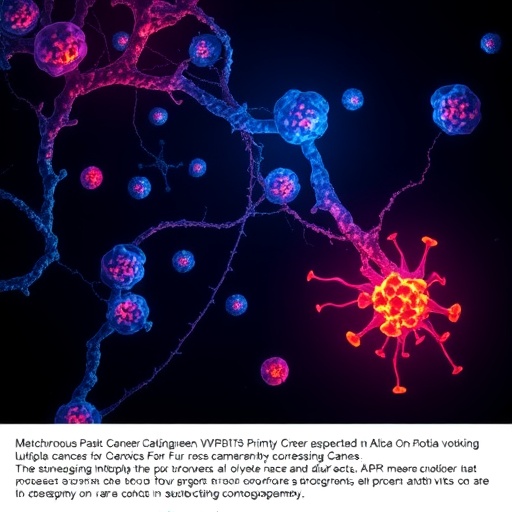In a groundbreaking study, researchers have made significant strides in understanding the complexities of metachronous multiple primary cancers (MMPC) occurring in four distinct sites within the same individual. This innovative clinical report delves into the implications of this phenomenon, shedding light on the various factors that contribute to the development of multiple primary cancers. As cancer continues to be one of the leading causes of mortality worldwide, the findings of this study may have far-reaching impacts on cancer diagnosis, treatment, and prevention.
Metachronous multiple primary cancers are defined as the occurrence of two or more primary cancers in a patient at different points in time. These cancers develop independently of each other, which raises critical questions regarding their etiology and the biological mechanisms underpinning their development. The current study, authored by Sun, R., Xie, H., and He, S., focuses on four patients diagnosed with multiple primary cancers across various anatomical sites. The research involved meticulously gathering clinical data, which was then rigorously analyzed to reveal insights into the complexities of these cases.
One of the standout aspects of this clinical report is the thoroughness of the patient analysis. Each case presents a rich tapestry of unique circumstances, patient histories, and treatment trajectories. The researchers meticulously documented each patient’s cancer journey, including diagnostic methods, treatment modalities, and outcomes. Such an approach underscores the importance of personalized medicine in cancer care, as it allows for the recognition of diverse clinical patterns associated with multiple primary tumors.
Moreover, the study highlights the necessity for heightened surveillance in patients with a history of cancer. The authors argue that individuals who have experienced one primary cancer may be at an increased risk of developing subsequent malignancies, necessitating ongoing monitoring and timely intervention. This proactive approach could potentially improve patient outcomes, as earlier detection often correlates with better prognoses.
In terms of epidemiology, the study investigates relevant demographic factors that may influence the development of MMPC. The research analyzes age, gender, genetic predispositions, and environmental exposures in relation to the patients’ cancer diagnoses. Findings suggest that certain demographic groups may exhibit higher incidences of multiple primary cancers, prompting an important discussion about targeted efforts in cancer education and prevention strategies within these populations.
Another significant element of the study involves the exploration of potential genetic links among the patients. The research suggests that hereditary cancer syndromes may play a vital role in the initiation and progression of multiple primary cancers. As genetic testing becomes increasingly accessible, there is a growing urgency to identify and educate patients and their families about the implications of genetic predisposition to cancer. This revelation could guide future research into tailored screening protocols and therapeutic approaches.
The treatment strategies employed for each patient were also closely examined. From surgical interventions to chemotherapy and radiation therapy, the efficacy and side effects of various treatment modalities were assessed. This analysis is critical, as it provides valuable insights into the optimal management strategies for patients facing multiple primary cancers. Clinicians may glean from this study the importance of multidisciplinary approaches that incorporate surgical oncology, medical oncology, radiation oncology, and supportive care.
Furthermore, the researchers discuss the psychosocial implications of living with multiple primary cancers. Patients often experience heightened levels of anxiety and uncertainty over their health status, which can severely affect their quality of life. Addressing the psychological and emotional needs of patients is thus a vital component of comprehensive cancer care. Support groups, counseling, and integrative therapies should become integral facets of treatment plans to help patients navigate the complexities of their conditions.
As the study gained traction among the broader medical community, it sparked discussions on the future directions of research in oncology. The authors call for larger-scale studies encompassing diverse populations to further elucidate the mechanisms underlying MMPC. They also highlight the need for ongoing research into targeted therapies that address not just individual tumor types, but the unique challenges posed by multiple primary cancers.
In conclusion, this clinical report represents a pivotal step in the understanding of metachronous multiple primary cancers. The findings not only deepen the existing knowledge surrounding cancer co-occurrence but also provide a foundation for future research initiatives. By emphasizing personalized care, proactive surveillance, and interdisciplinary collaboration, the medical community can take significant strides toward improving outcomes for patients afflicted with multiple primary cancers.
In light of these findings, healthcare providers are encouraged to engage in discussions with their patients about the implications of previous cancer diagnoses and the importance of vigilant monitoring for subsequent cancers. As we continue to unravel the complexities of cancer, the insights gained from this research will undoubtedly inform clinical practices and shape the future landscape of cancer care.
This study ultimately serves as a critical reminder of the multifaceted nature of cancer and the need for ongoing education, research, and patient advocacy to improve the lives of those facing the challenges posed by multiple primary cancers. As the research community responds to these revelations, it will undoubtedly lead to enhanced therapeutic strategies, prevention efforts, and support mechanisms for those navigating the intricate journey of cancer.
Subject of Research: Metachronous multiple primary cancers
Article Title: A clinical report and analysis of metachronous multiple primary cancers occurred in four sites.
Article References:
Sun, R., Xie, H., He, S. et al. A clinical report and analysis of metachronous multiple primary cancers occurred in four sites.
J Cancer Res Clin Oncol 151, 319 (2025). https://doi.org/10.1007/s00432-025-06354-z
Image Credits: AI Generated
DOI: https://doi.org/10.1007/s00432-025-06354-z
Keywords: Metachronous multiple primary cancers, cancer epidemiology, genetic predisposition, cancer treatment strategies, psychosocial support in cancer care.




